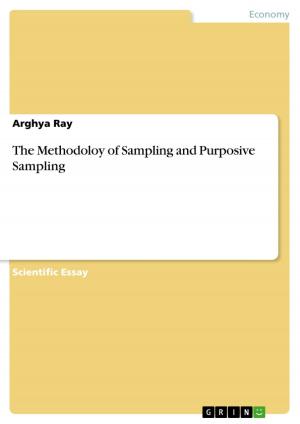History of Science and Technology in India in the Context of the 'Great Synergy'
Nonfiction, Social & Cultural Studies, Social Science| Author: | Nadja Schuppenhauer | ISBN: | 9783640446452 |
| Publisher: | GRIN Publishing | Publication: | October 15, 2009 |
| Imprint: | GRIN Publishing | Language: | English |
| Author: | Nadja Schuppenhauer |
| ISBN: | 9783640446452 |
| Publisher: | GRIN Publishing |
| Publication: | October 15, 2009 |
| Imprint: | GRIN Publishing |
| Language: | English |
Seminar paper from the year 2008 in the subject Business economics - Economic and Social History, grade: 1,0, European University Viadrina Frankfurt (Oder) (Lehrstuhl für Wirtschafts- und Sozialgeschichte der Neuzeit), course: The Great Divergence. History and Legacy of Industrialization in Europe and Asia, language: English, abstract: The purpose of this paper is the discussion of a recent article presented by Joel Mokyr who offered, according to his own words, a new 'variant of the European Miracle question'1. The main thesis of his article The Great Synergy: the European Enlightenment as a factor in Modern Economic growth points to the European Enlightenment as being a crucial factor for attaining and establishing modern, i.e. sustainable economic growth in Europe once the British Industrial Revolution had overcome its humble beginnings at the end of the eighteenth century. Mokyr argues that the stability of economic growth which was reached in Europe after 1825 was to a great extent due to a new attitude towards the relation between technology and progress. This new attitude was the result of a development that had its roots in the European Enlightenment where the foundations for a new understanding of science and technology were laid. The outcome of this development was the unique 'idea of research' that made scientists and craftsmen cooperate, giving way to a very fruitful convergence of science and technology that helped making sustainable economic growth possible. This evolution mingled with the modification of institutional mechanisms which was a result of the Enlightenment, too. These two trends both formed a 'Great Synergy' that finally yielded the 'European Miracle'. To prove and strengthen his thesis, Mokyr compares the history of European sciences with those practiced in China coming to see that Chinese sciences were confined to and restricted by the Mandarin rulers, thus a situation similar to pre-enlightened Europe. But his comparisons to the Asian continent are limited to the situation in China. It could therefore be telling to have a look at Indian sciences, especially when discovering that India 'had a wellestablished scientific and technological tradition of its own long before being subjected to an extended period of European colonial rule'2. Going deeper into Indian history we will see, that on top of that, before the colonization by the British, 'traditional knowledge generated large-scale economic productivity for Indians'3. Departing from these considerations, the present paper will put Mokyr's assumption under inspection examining the Indian history of science and technology. The arising problem is thus twofold, implicating questions that are clearly inter-related with each other and which are touching fields both of science and economy. [...]
Seminar paper from the year 2008 in the subject Business economics - Economic and Social History, grade: 1,0, European University Viadrina Frankfurt (Oder) (Lehrstuhl für Wirtschafts- und Sozialgeschichte der Neuzeit), course: The Great Divergence. History and Legacy of Industrialization in Europe and Asia, language: English, abstract: The purpose of this paper is the discussion of a recent article presented by Joel Mokyr who offered, according to his own words, a new 'variant of the European Miracle question'1. The main thesis of his article The Great Synergy: the European Enlightenment as a factor in Modern Economic growth points to the European Enlightenment as being a crucial factor for attaining and establishing modern, i.e. sustainable economic growth in Europe once the British Industrial Revolution had overcome its humble beginnings at the end of the eighteenth century. Mokyr argues that the stability of economic growth which was reached in Europe after 1825 was to a great extent due to a new attitude towards the relation between technology and progress. This new attitude was the result of a development that had its roots in the European Enlightenment where the foundations for a new understanding of science and technology were laid. The outcome of this development was the unique 'idea of research' that made scientists and craftsmen cooperate, giving way to a very fruitful convergence of science and technology that helped making sustainable economic growth possible. This evolution mingled with the modification of institutional mechanisms which was a result of the Enlightenment, too. These two trends both formed a 'Great Synergy' that finally yielded the 'European Miracle'. To prove and strengthen his thesis, Mokyr compares the history of European sciences with those practiced in China coming to see that Chinese sciences were confined to and restricted by the Mandarin rulers, thus a situation similar to pre-enlightened Europe. But his comparisons to the Asian continent are limited to the situation in China. It could therefore be telling to have a look at Indian sciences, especially when discovering that India 'had a wellestablished scientific and technological tradition of its own long before being subjected to an extended period of European colonial rule'2. Going deeper into Indian history we will see, that on top of that, before the colonization by the British, 'traditional knowledge generated large-scale economic productivity for Indians'3. Departing from these considerations, the present paper will put Mokyr's assumption under inspection examining the Indian history of science and technology. The arising problem is thus twofold, implicating questions that are clearly inter-related with each other and which are touching fields both of science and economy. [...]















